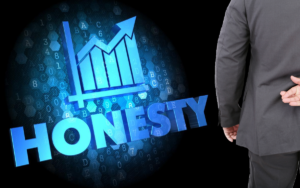Since the 2016 presidential election, numerous studies and articles about fake news stories have been published. Fake news is not a new phenomenon. Eugene Kiely (@ekiely) and Lori Robertson from FactCheck.org write, “Fake news is nothing new. But bogus stories can reach more people more quickly via social media than what good old-fashioned viral emails could accomplish in years past.”[1] Social media is, in fact, playing a major role in spreading fake news; but, lies have always found a way to speed themselves through society. Way back in 1710, Jonathan Swift, most famous for penning Gulliver’s Travels, wrote in The Examiner, “Falsehood flies, and the truth comes limping after it.”[2] Even Swift, however, might be surprised how fast falsehoods can fly in the Information Age.
Social Media and Fake News
“Do lies really spread faster than truth?” asks Megan McArdle (@asymmetricinfo). “Definitely yes, according to a new paper from Soroush Vosoughi and Deb Roy of MIT’s Media Lab, and Sinan Aral, a professor at the institute’s Sloan School of Management. In fact, these researchers found, ‘It took the truth about six times as long as falsehood to reach 1,500 people.’ You might comfort yourself that lies and the truth must be the proverbial hare and tortoise, with the lies racing out of the starting gate, and the truth eventually catching up, perhaps? Sadly no, at least not on social media: ‘Falsehood also reached far more people than the truth.'”[3] Not only do false stories reach more people, according to Vosoughi and Roy, they have greater impact as well. McArdle asked them, “Why are lies so much more powerful than the truth?” They told her, “‘Novelty’ may be one answer: Fake news stories offer more of it than does real news.” McArdle notes, however, that novelty is only part of the answer. Fake news provides a compelling narrative, and because it’s fake, facts don’t matter. McArdle asserts fake news spreads faster and has greater impact precisely because there is no gatekeeper. She explains, “The difference between social media and ‘the media’ is that the gatekeeper model, for all its problems, does care more about the truth than ‘the narrative’.” Have mainstream media outlets been fooled into publishing fake news? Of course. But, McArdle asserts, “The truth about those stories was hunted down, and corrected, by the same mainstream media that got them wrong in the first place.”
Another explanation for why fake news played such a large role in the 2016 elections involves software “bots.” The argument was that tireless bots were busy spreading falsehoods faster than they could be corroborated. Dr. Katie Langin (@k_langin) writes, “From Russian ‘bots’ to charges of fake news, headlines are awash in stories about dubious information going viral.”[4] Citing the same study as McArdle, she continues, “You might think that bots — automated systems that can share information online — are to blame. But a new study shows that people are the prime culprits when it comes to the propagation of misinformation through social networks. And they’re good at it, too: Tweets containing falsehoods reach 1500 people on Twitter six times faster than truthful tweets, the research reveals.” Soroush Vosoughi, one of the study’s principal authors, became interested in the subject he realized “these rumors aren’t just fun things on Twitter, they really can have effects on people’s lives and hurt them really badly.”
Countering Fake News
If you are unclear about what constitutes fake news, you’re probably not alone. Economists Hunt Alcott and Matthew Gentzkow, define fake news as stories “intentionally and verifiably false and could mislead readers.”[5] Despite the devastating effects fake news can have on individual lives or the impact such stories can have on events like elections, there is no way stop fake news. One reason is economic. David Mikkelson (@snopes), founder of Snopes, asserts, “Certainly, the online world is full of fake news — fabricated stories set loose via social media with clickbait headlines and tantalizing images, intended for no purpose other than to fool readers and generate advertising revenues for their publishers.”[6] Journalist Masha Gessen (@mashagessen) points to Alcott’s and Gentzkow’s conclusion that about eight per cent of people actually believe fake news and concluded it wasn’t much of problem.[7] Nevertheless, Alcott and Gentzkow assert, “It is both privately and socially valuable when people can infer the true state of the world.” Even Gessen admits, “An informed public is a necessary condition of democracy, but not a sufficient one. Democracy may indeed die in darkness, but light is no guarantee that it will survive.”
For many people and organizations, sorting truth from fiction is important. In January, a leadership team of experienced media industry executives announced later this year they will launch VIDL News (Vital Intelligence Data Live). It is a proprietary technology platform that will detect, collect and report news events and incidents in real time across the globe. A VIDL News press release stated, “For the first time in history, no room will be left for the human error and biased opinions that proliferate existing major news outlets. Relying on the integration of advanced Artificial Intelligence and Blockchain technology, the nonpartisan next-generation news service will create a new paradigm to rely solely on fully automated analytics to track and verify accurate breaking news monitored from data feeds, social media and trusted journalism sources before distributing it via push notifications.”[8] My company, Enterra Solutions® is playing a significant role in this venture. As I stated in the release, “We are very excited to be partners with VIDL in the development and implementation of a proprietary ‘Truth in News’ AI platform. The application of machine and deep learning to breaking news and editorial stories will bring consumer trust back to the media marketplace by analyzing third-party news stories, social media posts and external data and providing users with accurate information.”
McArdle concludes, “Perhaps the real reason fake news spreads so far and so fast is not that we don’t know better; it is that we know exactly what we’re doing and, more and more, we feel free to do it. If you care more about winning a political argument than making true claims … well, the truth will do in a pinch, but a purpose-built lie is likely to work better. In that world, lies will get first-class tickets on the fastest transport available, while the truth will find itself slowed to a crawl — and becoming persona non grata whenever it strays into unfriendly territory.” The VIDL News service obviously won’t eliminate fake news; but, it will provide users with a source of verified news. For the first time, truth may travel as fast falsehood for those who care.
Footnotes
[1] Eugene Kiely and Lori Robertson, “How to Spot Fake News,” Factcheck.org, 18 November 2016.
[2] Joshua Gillin, “NFL’s Colin Kaepernick incorrectly credits Winston Churchill for quote about lies,” Pundit Facts, 9 October 2017.
[3] Megan McArdle, “We finally know for sure that lies spread faster than the truth. This might be why.” The Washington Post, 14 March 2018.
[4] Katie Langin, “Fake news spreads faster than true news on Twitter—thanks to people, not bots,” Science, 8 March 2018.
[5] Hunt Alcott and Matthew Gentzkow, “Social Media and Fake News in the 2016 Election,” Journal of Economic Perspectives, Spring 2017.
[6] David Mikkelson, “We Have a Bad News Problem, Not a Fake News Problem,” Snopes, 17 November 2016.
[7] Masha Gessen, “Fighting Fake News is Not the Solution,” The New Yorker, 4 January 2018.
[8] VIDL, “Media Industry Titans to Launch VIDL, a Transformational News Technology Platform Utilizing AI Technology and Blockchain to Report Accurate Global News Events and Incidents in an Automated Real-Time Manner,” Cision PR Newswire, 9 January 2018.





